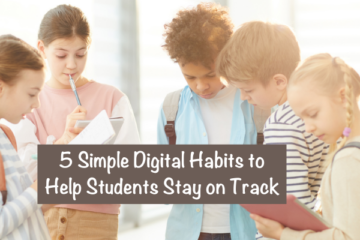How Educators Can Become Change Agents

Boost Your Impact: How Educators Can Become Change Agents
Have you ever caught yourself thinking, “There has to be more I can do”?
Maybe you’ve looked around your classroom and seen opportunities for improvement—not just in your lessons, but across your whole school or district.
If that sounds like you, you’re not alone. More and more educators are stepping into bigger roles, leading meaningful change in their schools, communities, and beyond.
You don’t have to become a principal or work in politics to make a difference. Being a change agent is about using your skills to solve problems, support others, and create better outcomes. In this article, we’ll explore practical ways to grow your impact as an educator, starting from where you are right now, with what you already know.
Step Into Leadership Roles
You don’t need a new title to be a leader. But if you’re looking to grow your influence, stepping into leadership positions can open up new opportunities to guide others and shape the future of education. Leadership roles in schools come in many forms—grade-level chair, department head, instructional coach, or curriculum coordinator. These positions allow you to share ideas, support peers, and help shape how your school operates on a deeper level.
If you want to lead with confidence and clarity, further training can help. Many educators explore doctorate of education online programs to build leadership skills, learn about organizational change, and gain a stronger voice in decision-making.
These programs are flexible and designed for working professionals, making them a solid option for anyone ready to take the next step without pausing their career or relocating.
Whether you’re leading a team or a classroom, real leadership begins when you speak up, take initiative, and model the change you want to see. Leadership doesn’t have to be loud or dramatic—it just has to be intentional and consistent.
Get Involved in Policy and Advocacy
Educational policy isn’t just something that happens “up there.” It affects your classroom every day, from how testing works to what resources are available. That’s why it matters that real educators have a seat at the table when those decisions are made.
Start local. Join your school’s improvement team or equity task force. Attend school board meetings and voice your perspective. Consider writing letters to district officials or submitting op-eds about what your students need. These small steps can make a big difference—and they help you grow as a leader who shapes policy, not just follows it.
Some educators even go on to work in educational advocacy, helping to influence decisions at the district, state, or national level. The key is to speak up. Your voice, backed by real-world classroom experience, brings value to the conversation and helps close the gap between policy and practice.
How Educators Can Become Change Agents – Focus on Equity and Inclusion
Schools should be places where every student feels seen, supported, and valued. As an educator, you’re in a strong position to push for changes that make classrooms more inclusive and equitable.
This could mean updating your reading list to reflect diverse voices, advocating for more accessible teaching tools, or helping your school review discipline policies that may unfairly affect certain groups of students. Equity work often starts with honest conversations and a willingness to look at the systems around you, even when it’s uncomfortable.
You don’t have to have all the answers. But by raising questions and working toward solutions, you can help create a learning environment that works better for everyone. Every step counts, even if progress feels slow at times.
Mentor New Educators
If you’ve been teaching for a while, you’ve learned a lot through experience—lessons that no college course can fully prepare someone for. That’s why mentoring is such a powerful way to create change.
New educators often feel overwhelmed. By offering support, guidance, and a listening ear, you can help them gain confidence and stay in the profession longer. And when newer teachers feel supported, the whole school benefits. Morale goes up, and collaboration becomes easier.
Mentoring doesn’t have to be formal. It can be as simple as checking in regularly, sharing resources, or inviting someone to observe your class. These small actions make a big impact and help build a stronger, more connected school culture. The support you offer today can shape someone’s entire career path.
Lead Innovation in the Classroom
Not all change needs to happen at the district level. Sometimes, it starts with a single idea in a single classroom. Maybe you’ve tried a new tech tool that got your students excited about learning, or you found a creative way to teach a tough concept. Share those wins with others who can benefit from your trial and error.
Talk to your team about what’s working. Present your strategies at a staff meeting or local education conference. Write a blog post or contribute to an online educator forum. When you share what’s working, you’re not just improving your classroom—you’re helping others grow, too.
Innovation doesn’t require a grant or a big project. It just needs curiosity, creativity, and the courage to try something different. Over time, these small changes can lead to bigger shifts in how your school approaches learning.
How Educators Can Become Change Agents – Collaborate With the Community
The best educational change often happens when schools and communities work together. Families, nonprofits, local businesses, and even students themselves can play a role in shaping what education looks like.
You might partner with a community group to host a reading night or start a service project with your students. Maybe you invite local leaders to speak in your class or co-create a program that supports students beyond school hours. These partnerships can build trust and open new doors.
Community collaboration builds deeper connections and helps students feel supported from all sides. It also helps you better understand what your students face outside the classroom—and how schools can respond in more thoughtful, supportive ways.
Final Thoughts – How Educators Can Become Change Agents
Educators don’t need permission to lead. You already have the insight, experience, and heart to make a difference. Whether you’re mentoring a new teacher, trying out a new approach in your classroom, or thinking about a leadership degree to grow your reach, there’s always a next step you can take.
Start where you are. Focus on what matters most to you. And remember, even small actions—done with purpose—can create a ripple effect in your school, your community, and beyond.
You’re not just teaching. You’re leading. And the impact you make can last far beyond the school year.
Were you encouraged by what you read?
Then, would you share this article with a friend, co-worker, or family member?
Or, maybe you can send it to a friend or family member?
This blog occasionally uses affiliate links and may contain affiliate links.
Additionally, Melanie Redd is a participant in the Amazon Services LLC Associates Program.
This is an affiliate advertising program designed to provide a means for sites to earn advertising fees. These are earned by advertising and linking to Amazon.com.
Also, for more on my disclosure policy, click HERE.
© Melanie Redd and Hope Ministry, 2025. Unauthorized use and/or duplication of this material without express and written permission from this blog’s author and/or owner is strictly prohibited.
Further, excerpts and links may be used, provided that full and clear credit is given to Melanie Redd and Hope Ministry.
Please give appropriate and specific directions to the original content.




0 Comments